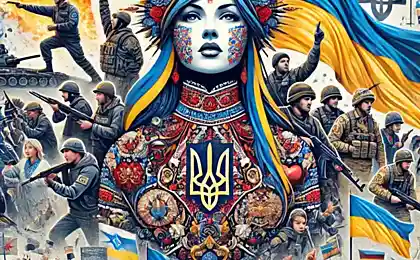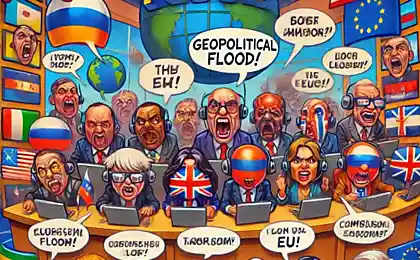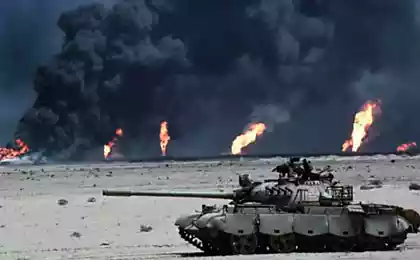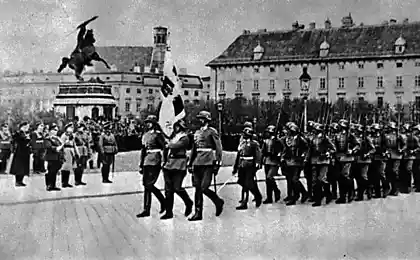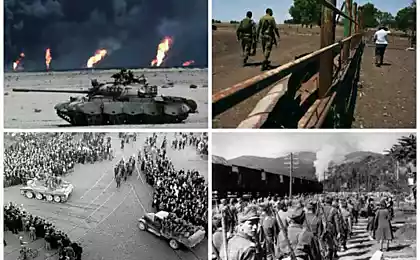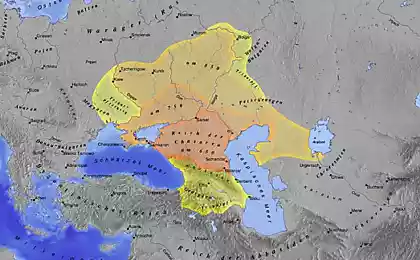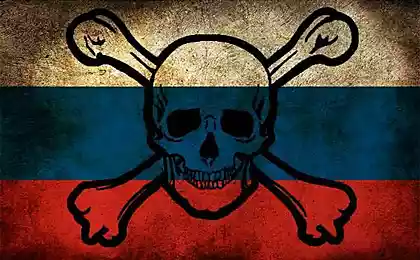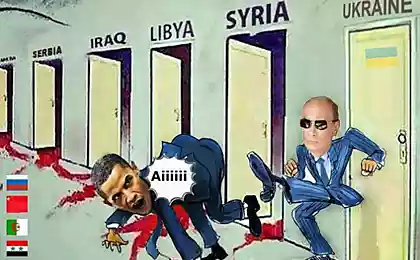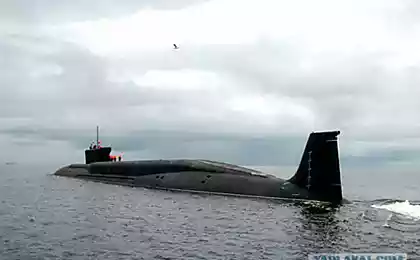1469
US sanctions for Dummies. Educational program of the FCO.
Yesterday, US House of Representatives overwhelmingly passed the "Law on support for the independence, integrity, democracy and economic stability in Ukraine by 2014".
The US Senate voted for the bill last week and for the entry into force of the law signed by US President left.


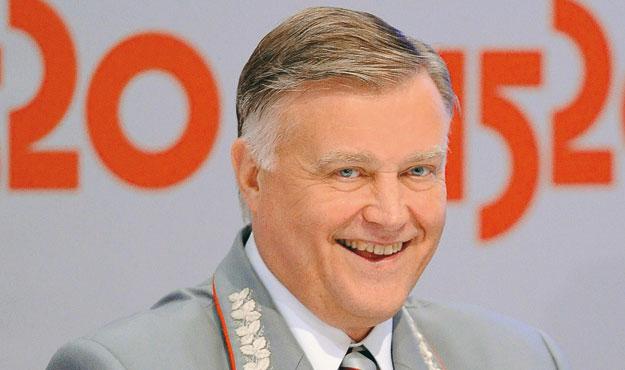
There is no doubt that Obama will sign this law, as in the beginning of March, he issued several decrees imposing sanctions against certain individuals in connection with the situation in Ukraine.
About these sanctions all write, but few people understand them. Media, which explains such things less and less with each passing day.
English read a few, and those who read, too lazy to read the text with all sorts of healthy yuridizmami terrible.
To make everyone's life, I asked an employee of investigations FBK Kulachenkova Nikita (who, incidentally, the main author of the report on corruption in the Olympics. Not a site, namely the report, be sure to read it) write a letter to all employees of FBK letter stating what kind of sanctions and to eliminate illiteracy in this direction.
And then we thought that you should not be greedy and let all hold.
And So. What are the sanctions entered against Russia.
Educational program from FBK:
The essence of the law, passed by the Senate and House of Representatives, as presented by the US position on the situation in Ukraine, as well as resolution and motivation of the US President and the executive authorities to perform certain actions.
These actions include:
- Provision of Ukraine loans and loan guarantees, including assistance from the IMF
- Help to return assets belonging to Ukrainian civil servants involved in corruption (name Yanukovych specified directly in the text, but about a golden loaf is not a word)
- Help in the creation of public institutions in Ukraine
- Strengthening cooperation on security issues
- Specifying the US Department of Defense on the preparation of an annual report on the military strength of the Russian Federation to the United States Senate
- The imposition of sanctions against certain groups of persons
And the last paragraph FBC considers it necessary to look more closely.
The law contains two articles relating to sanctions. The first article, entitled "Sanctions for those responsible for the violence, violation of territorial integrity of the world and Ukraine" obliges the US President to impose sanctions on those persons.
The second article, entitled "Sanctions for members of the Russian Federation, involved or responsible for significant corruption" allow and encourage the President of the United States to impose sanctions against the following persons:
a) Any officer of the Russian government, or associated person or a family member of such person, at the discretion of the President of the United States, responsible for or involved in the commission of, control or significant corrupt practices in the Russian Federation, including the exclusion of private or public property for personal gain, corruption in government contracts, mining, bribery, as well as facilitating the implementation of the transfer or funds derived from acts of corruption in foreign jurisdictions.
b) Any person who, at the discretion of the President of the United States, greatly assist the above persons, including the provision of financial, real or technological assistance, or goods and services.
Note that in the second article says nothing about Ukraine, ie possible sanctions against any corrupt officials from Russia, even if they have not heard anything about the situation in Ukraine and Crimea.
Who exactly is meant by persons about whom they say in these articles can be seen in the Decree of the President of the United States. Decrees have actually imposed sanctions on Ukrainian and Crimean officials, as well as Russian officials and businessmen, members of the so-called "inner circle" of the Russian leadership.
Sanctions.
Now let's look at what the law defines as sanctions:
a) Blocking of assets. The President is authorized to use all the powers provided by the Act on Emergency Economic Powers Act, necessary to block and ban transactions with the property and the property rights of persons against whom sanctions are imposed if such property or rights are located in the United States or subject to the jurisdiction of the United States or are covered by a control of the person or entity the US.
b) Prohibition of entry in the United States and a review of visa. The person against whom sanctions are imposed, should be deprived of the right to enter the United States or deported, the visa can be canceled, and the issuance of new visas denied.
The second paragraph of everything is quite simple, but the implications of paragraph about blocking assets worth exploring more.
In the US Treasury Department has a division called the "Office of Foreign Assets Control" (OFAC) and is responsible for the implementation of US economic sanctions. This Office administers a list of businesses and individuals, which is called "List of Specially Designated Nationals and persons subject to blocking" (SDN).
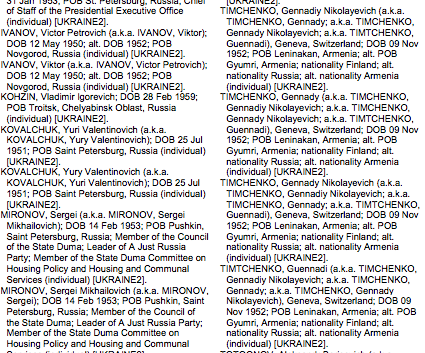
so it looks
Full list contains more than six thousand individuals and legal entities in respect of which the US imposed sanctions. In this list you will find: drug dealers, terrorists, arms dealers, young African leaders, as well as the president and owner of Railways (like the former) oil trader Gunvor.
US citizens and US companies are not allowed to do business with all these wonderful people. Beginners of this honorable list waits for the next.
Blocking of assets
Any property, real estate, bank accounts, shares in American companies or securities traded on US exchanges, which are owned by persons or entities present in the list are blocked. Ie This property of the person will not be able to dispose of. This does not mean necessarily that the property will be confiscated, but using it will not work until the sanctions are lifted. By the way, the blocked funds in banks even interest will accrue.
The ban on transactions with US companies
US citizens and US companies, including banks, are prohibited to do business with those present in the list. Ie person from the list will not be able to translate not only into or out of a US bank, but also through US banks.
If someone will translate to a person from the list, and the correspondent bank will be US bank, this transfer will not work. Moreover, the US correspondent bank will block translatable through it means and they not only did not reach the recipient, but will not return to sender.
But that's not all: the American bank is obliged to block the operation, even if there are no persons of spicka, but that person is related to the operation or receive benefits from it. This means that the operation relatives can theoretically also be blocked.

Andrei Yakunin. Lives with his family in a house in North London $ 4, 5 million pounds.
The prohibition applies not only to the transactions with the banks, but also with any other American companies. Ie person from the list or his companies will not be able to buy anything from an American company.
According to unconfirmed reports, FBK, one major American corporation has already initiated termination of contracts with "Gazprom Drilling", owned by Arkady Rottenberg.
Consequences of non-US banks:
Of course, a person from the list are still able to carry out transactions through non-US banks, but here they were waiting for an unpleasant surprise. The fact that the list SDN is a widely used instrument functions when operating in compliance banks around the world. One of the main tasks of the compliance function in banks is the prevention and detection of suspicious transactions to reduce the financial, legal and reputational risks.
One of the primary tools for the identification of suspicious transactions is to test future customers, payers and recipients for the presence of any lists. One of these lists is the SDN.
Typically, the bank's information system automatically searches for matches the name or names of the counterparty with contractors on the list and, if a match is found, stop the operation. For non-US banks, in the case of presence of a person in the list of SDN, lock operation is not mandatory, but the implementation of the operation is likely to require separate approval by a person responsible for compliance. A charge of compliance may request the person performing such an operation additional documents and other ways to prevent and delay the implementation of the operation, which disrupts the normal operation face.
If a person from a list of SDN comes to the bank and asked to open an account, then this check list is carried out in the framework of procedures "Know Your Customer" and the person most likely simply refuse from the same reputational considerations.
Conclusion
The imposition of sanctions is to face not only an exception to the US business environment, but also a significant difficulty in doing business around the world. In fact, a person is isolated and can safely conduct business only in their own state. We can say that now Gennady Timcheko will be much harder "to serve Russia" and Vladimir Yakunin will be difficult to show "honesty" around the world.
Thank you very much for the explanation of Nikita.
I'd add: as long as anything that could harm the people of Russia, and not a bunch of bandits who rob 24/7 this nation, in the instrument of sanctions is not detected.
Read and pass on to others: navalny.us
The mirror of this post: navalny.us/920813.html
The US Senate voted for the bill last week and for the entry into force of the law signed by US President left.



There is no doubt that Obama will sign this law, as in the beginning of March, he issued several decrees imposing sanctions against certain individuals in connection with the situation in Ukraine.
About these sanctions all write, but few people understand them. Media, which explains such things less and less with each passing day.
English read a few, and those who read, too lazy to read the text with all sorts of healthy yuridizmami terrible.
To make everyone's life, I asked an employee of investigations FBK Kulachenkova Nikita (who, incidentally, the main author of the report on corruption in the Olympics. Not a site, namely the report, be sure to read it) write a letter to all employees of FBK letter stating what kind of sanctions and to eliminate illiteracy in this direction.
And then we thought that you should not be greedy and let all hold.
And So. What are the sanctions entered against Russia.
Educational program from FBK:
The essence of the law, passed by the Senate and House of Representatives, as presented by the US position on the situation in Ukraine, as well as resolution and motivation of the US President and the executive authorities to perform certain actions.
These actions include:
- Provision of Ukraine loans and loan guarantees, including assistance from the IMF
- Help to return assets belonging to Ukrainian civil servants involved in corruption (name Yanukovych specified directly in the text, but about a golden loaf is not a word)
- Help in the creation of public institutions in Ukraine
- Strengthening cooperation on security issues
- Specifying the US Department of Defense on the preparation of an annual report on the military strength of the Russian Federation to the United States Senate
- The imposition of sanctions against certain groups of persons
And the last paragraph FBC considers it necessary to look more closely.
The law contains two articles relating to sanctions. The first article, entitled "Sanctions for those responsible for the violence, violation of territorial integrity of the world and Ukraine" obliges the US President to impose sanctions on those persons.
The second article, entitled "Sanctions for members of the Russian Federation, involved or responsible for significant corruption" allow and encourage the President of the United States to impose sanctions against the following persons:
a) Any officer of the Russian government, or associated person or a family member of such person, at the discretion of the President of the United States, responsible for or involved in the commission of, control or significant corrupt practices in the Russian Federation, including the exclusion of private or public property for personal gain, corruption in government contracts, mining, bribery, as well as facilitating the implementation of the transfer or funds derived from acts of corruption in foreign jurisdictions.
b) Any person who, at the discretion of the President of the United States, greatly assist the above persons, including the provision of financial, real or technological assistance, or goods and services.
Note that in the second article says nothing about Ukraine, ie possible sanctions against any corrupt officials from Russia, even if they have not heard anything about the situation in Ukraine and Crimea.
Who exactly is meant by persons about whom they say in these articles can be seen in the Decree of the President of the United States. Decrees have actually imposed sanctions on Ukrainian and Crimean officials, as well as Russian officials and businessmen, members of the so-called "inner circle" of the Russian leadership.
Sanctions.
Now let's look at what the law defines as sanctions:
a) Blocking of assets. The President is authorized to use all the powers provided by the Act on Emergency Economic Powers Act, necessary to block and ban transactions with the property and the property rights of persons against whom sanctions are imposed if such property or rights are located in the United States or subject to the jurisdiction of the United States or are covered by a control of the person or entity the US.
b) Prohibition of entry in the United States and a review of visa. The person against whom sanctions are imposed, should be deprived of the right to enter the United States or deported, the visa can be canceled, and the issuance of new visas denied.
The second paragraph of everything is quite simple, but the implications of paragraph about blocking assets worth exploring more.
In the US Treasury Department has a division called the "Office of Foreign Assets Control" (OFAC) and is responsible for the implementation of US economic sanctions. This Office administers a list of businesses and individuals, which is called "List of Specially Designated Nationals and persons subject to blocking" (SDN).

so it looks
Full list contains more than six thousand individuals and legal entities in respect of which the US imposed sanctions. In this list you will find: drug dealers, terrorists, arms dealers, young African leaders, as well as the president and owner of Railways (like the former) oil trader Gunvor.
US citizens and US companies are not allowed to do business with all these wonderful people. Beginners of this honorable list waits for the next.
Blocking of assets
Any property, real estate, bank accounts, shares in American companies or securities traded on US exchanges, which are owned by persons or entities present in the list are blocked. Ie This property of the person will not be able to dispose of. This does not mean necessarily that the property will be confiscated, but using it will not work until the sanctions are lifted. By the way, the blocked funds in banks even interest will accrue.
The ban on transactions with US companies
US citizens and US companies, including banks, are prohibited to do business with those present in the list. Ie person from the list will not be able to translate not only into or out of a US bank, but also through US banks.
If someone will translate to a person from the list, and the correspondent bank will be US bank, this transfer will not work. Moreover, the US correspondent bank will block translatable through it means and they not only did not reach the recipient, but will not return to sender.
But that's not all: the American bank is obliged to block the operation, even if there are no persons of spicka, but that person is related to the operation or receive benefits from it. This means that the operation relatives can theoretically also be blocked.

Andrei Yakunin. Lives with his family in a house in North London $ 4, 5 million pounds.
The prohibition applies not only to the transactions with the banks, but also with any other American companies. Ie person from the list or his companies will not be able to buy anything from an American company.
According to unconfirmed reports, FBK, one major American corporation has already initiated termination of contracts with "Gazprom Drilling", owned by Arkady Rottenberg.
Consequences of non-US banks:
Of course, a person from the list are still able to carry out transactions through non-US banks, but here they were waiting for an unpleasant surprise. The fact that the list SDN is a widely used instrument functions when operating in compliance banks around the world. One of the main tasks of the compliance function in banks is the prevention and detection of suspicious transactions to reduce the financial, legal and reputational risks.
One of the primary tools for the identification of suspicious transactions is to test future customers, payers and recipients for the presence of any lists. One of these lists is the SDN.
Typically, the bank's information system automatically searches for matches the name or names of the counterparty with contractors on the list and, if a match is found, stop the operation. For non-US banks, in the case of presence of a person in the list of SDN, lock operation is not mandatory, but the implementation of the operation is likely to require separate approval by a person responsible for compliance. A charge of compliance may request the person performing such an operation additional documents and other ways to prevent and delay the implementation of the operation, which disrupts the normal operation face.
If a person from a list of SDN comes to the bank and asked to open an account, then this check list is carried out in the framework of procedures "Know Your Customer" and the person most likely simply refuse from the same reputational considerations.
Conclusion
The imposition of sanctions is to face not only an exception to the US business environment, but also a significant difficulty in doing business around the world. In fact, a person is isolated and can safely conduct business only in their own state. We can say that now Gennady Timcheko will be much harder "to serve Russia" and Vladimir Yakunin will be difficult to show "honesty" around the world.
Thank you very much for the explanation of Nikita.
I'd add: as long as anything that could harm the people of Russia, and not a bunch of bandits who rob 24/7 this nation, in the instrument of sanctions is not detected.
Read and pass on to others: navalny.us
The mirror of this post: navalny.us/920813.html

